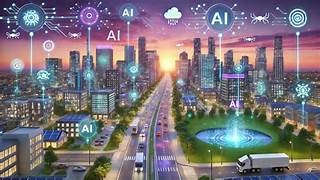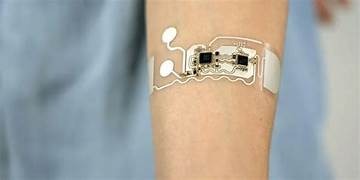
AI in Gadgets: Helpful Assistant or Hidden Risk?
With AI embedded in everyday gadgets, it’s transforming how we live. But is this technological advancement making our lives easier or quietly becoming a potential risk we can't ignore?
✨ Raghav Jain

Introduction: AI in Gadgets – Revolutionizing Daily Life
Artificial Intelligence (AI) is no longer a futuristic concept. It's already woven into the fabric of daily life through smartphones, home assistants, wearables, and even cars. Today, AI is making gadgets smarter, faster, and more intuitive, but as we lean into this technology, we must ask ourselves: Is AI really helping us, or is it becoming a hidden risk?
In this article, we’ll explore how AI is integrated into various gadgets, the advantages it brings, the potential risks involved, and whether the promises of AI outweigh the challenges it presents. From voice assistants to health-monitoring devices, AI has permeated numerous sectors of technology. However, like any powerful tool, it comes with both positive and negative consequences.
Let’s take a closer look at how AI is transforming gadgets and the implications for our future.
The Rise of AI in Everyday Gadgets
AI-Powered Personal Assistants: Changing the Way We Interact with Devices
One of the most notable examples of AI in gadgets is the rise of personal assistants such as Amazon Alexa, Apple Siri, and Google Assistant. These devices have revolutionized the way people interact with their gadgets. Gone are the days of typing into a search engine or manually inputting data into an app. With the power of AI, these virtual assistants can understand natural language, answer questions, set reminders, control smart home devices, and even provide real-time weather updates.
What sets these AI systems apart from traditional gadgets is their ability to learn from user behavior. Over time, they become more personalized, adjusting their responses based on preferences, habits, and even specific vocabulary. For instance, if you regularly ask for traffic updates before leaving for work, your AI assistant will begin offering this information automatically. While this feature enhances convenience, it raises concerns about data privacy and surveillance. These assistants are constantly listening, and their ability to collect, store, and analyze data brings forth questions about user consent and data protection.
Smartphones: More Than Just Communication Tools
Smartphones are perhaps the most ubiquitous gadgets incorporating AI. They’ve evolved from simple communication devices to powerful mini-computers with sophisticated AI algorithms powering many of their functions. AI enables features like facial recognition, predictive text, camera enhancements, and personalized app recommendations.
For example, the latest AI algorithms in smartphone cameras improve picture quality in real-time, adjusting settings like lighting, focus, and exposure without requiring user input. This AI-driven enhancement has made smartphones an essential tool for photography, eliminating the need for expensive, specialized equipment. However, this convenience is not without drawbacks. The cameras’ AI-powered features often come with a trade-off in terms of privacy. Many smartphone manufacturers have access to user data through apps and services that track user habits. Moreover, AI's increasing role in facial recognition technology has sparked debates about its potential misuse for surveillance or identity theft.
Wearable Gadgets: Health Monitoring and Beyond
Wearable devices such as Fitbit, Apple Watch, and Garmin are redefining personal health management. These gadgets use AI to track and analyze a wide range of health metrics, including heart rate, sleep patterns, activity levels, and even stress. With advanced algorithms, wearables provide users with insights and recommendations to improve their well-being.
The ability to monitor real-time health data has revolutionized preventive healthcare. For example, the Apple Watch uses AI to detect irregular heart rhythms and notify users of potential health concerns, allowing them to take action before a serious issue arises. The seamless integration of AI into wearable technology is helping individuals manage chronic conditions, prevent potential health crises, and improve overall wellness.
However, the data generated by these devices is sensitive, and their AI-powered health algorithms are only as good as the data they process. If compromised, personal health data could be used in harmful ways, such as for discrimination in insurance or employment. Additionally, there are concerns about the accuracy of AI predictions in health diagnostics. An over-reliance on AI-generated health recommendations could lead to false positives or false negatives, causing undue stress or preventing necessary medical intervention.
The Advantages of AI in Gadgets
Increased Efficiency and Convenience
One of the most significant benefits of AI in gadgets is the increased efficiency and convenience it brings. Smart devices can automate everyday tasks, freeing up time for more important activities. With AI’s ability to analyze patterns and make decisions based on vast amounts of data, devices can anticipate needs and adjust functions accordingly.
For example, AI-powered home assistants can control the thermostat based on your preferences, manage lighting schedules, and even order groceries for you. This level of convenience saves time and energy, enhancing productivity and overall quality of life.
Improved User Experience Through Personalization
AI’s ability to personalize the user experience is another advantage. By learning about individual preferences, behaviors, and routines, AI-powered gadgets provide a tailored experience. For instance, streaming services like Netflix or Spotify use AI to recommend content based on past viewing or listening history. This personalized approach improves the user experience, making it more engaging and enjoyable.
AI also enables predictive functionalities, allowing gadgets to anticipate your needs before you even express them. This feature is seen in smart home systems, where AI-powered devices adjust settings based on the time of day, weather conditions, or your past behavior. The result is a more streamlined and efficient lifestyle.
The Hidden Risks of AI in Gadgets
Privacy Concerns: Who Has Access to Your Data?
With the rise of AI comes the inevitable data collection that powers these smart devices. From health data to daily habits, AI relies on vast amounts of personal information to function effectively. While this data enhances the functionality of devices, it also opens the door to significant privacy concerns.
Companies that manufacture these gadgets often collect personal data from users to improve AI systems. However, this data can be vulnerable to hacking, misuse, or exploitation. In some cases, third-party companies may gain access to sensitive data, leading to concerns about privacy invasion. A recent study found that 81% of people are worried about how tech companies use their data, especially when it comes to AI-based devices.
Furthermore, the proliferation of voice-activated assistants like Alexa and Siri raises additional privacy issues. These devices are always listening for commands, creating a potential risk of eavesdropping. The data they collect can be stored in databases, which can be accessed by hackers, law enforcement, or even the companies themselves, raising questions about how secure personal conversations and activities really are.
AI and the Threat of Automation: Job Displacement and Economic Impact
As AI continues to evolve, it is increasingly capable of performing tasks that were once the domain of human workers. From self-checkout machines in grocery stores to AI-powered customer service chatbots, automation is already making its mark in the workforce. As AI becomes more advanced, its ability to replace human workers in various sectors, including retail, transportation, and even healthcare, raises questions about job displacement and economic inequality.
Some economists warn that the rapid rise of automation could lead to a widening gap between those who benefit from AI advancements and those whose jobs are displaced by them. While AI in gadgets offers convenience, it also forces us to reckon with the potential consequences of automation on the job market and economy.
Bias in AI: Can Machines Be Truly Fair?
AI is only as good as the data it is trained on, and unfortunately, the data used to train AI systems is not always unbiased. Studies have shown that AI algorithms can perpetuate existing societal biases, such as racial and gender inequalities. For example, facial recognition technology has been found to have higher error rates for women and people of color. This issue becomes particularly concerning when AI is used in sensitive contexts, such as hiring decisions, criminal justice, or healthcare.
The risk of bias in AI is not limited to facial recognition. AI chatbots and recommendation systems can inadvertently reinforce stereotypes, preferences, and biases present in historical data. Addressing AI bias is crucial for ensuring that these technologies don’t perpetuate existing inequalities.
Dependence on AI: Are We Losing Our Critical Thinking Skills?
With the increasing reliance on AI, there’s a growing concern about the loss of human autonomy and decision-making. Many people now depend on AI-powered gadgets for everyday tasks, from scheduling appointments to answering questions. While this level of automation can be helpful, it may also lead to a decline in critical thinking and problem-solving skills.
Relying on AI for decision-making could cause people to become more passive in their thinking, allowing technology to make choices for them instead of engaging in independent thought. This dependency could have long-term implications for intellectual development and creativity.
AI and Consumer Privacy: A Delicate Balance
As AI systems become smarter and more integrated into personal gadgets, concerns about privacy and data security continue to grow. The very nature of AI requires access to vast amounts of data, which is crucial for the algorithms to learn and function properly. This often includes sensitive personal information, such as location data, voice recordings, and even health metrics.
When it comes to voice assistants like Alexa or Siri, they are constantly listening for commands and potentially recording conversations. While companies claim these recordings are anonymized and used only to improve services, the sheer volume of data collected over time raises significant privacy concerns. Even if companies have good intentions, there is the risk that this data could be hacked, misused, or sold to third parties without the user’s knowledge or consent.
One key issue is that most consumers are not fully aware of the extent to which their data is collected. Many gadgets have terms and conditions that are difficult to understand, and people often overlook the privacy implications of using these devices. Transparency in how data is handled, as well as the ability for consumers to opt-out or control what data is shared, are crucial steps in addressing privacy concerns.
While AI can greatly enhance convenience and efficiency, the ethical use of personal data will be a critical challenge in the coming years. Stronger regulations—such as General Data Protection Regulation (GDPR) in Europe—are a good first step, but continuous vigilance will be required to ensure that AI in gadgets does not infringe upon user privacy or personal freedoms.
The Potential of AI in Smart Homes and the Internet of Things (IoT)
AI’s Role in Building Smarter Homes
Smart homes are becoming more intelligent and connected, with IoT (Internet of Things) devices at the heart of this revolution. From smart thermostats that adjust the temperature based on your habits to smart refrigerators that track food inventory and suggest recipes, AI is playing a pivotal role in home automation.
For example, Nest, a popular AI-powered thermostat, learns your temperature preferences and adjusts accordingly, leading to energy savings. Smart speakers like Google Home or Amazon Echo can not only answer questions but also control other smart devices in your home, such as lights, security cameras, and entertainment systems.
With the help of AI, smart homes are becoming more efficient, secure, and comfortable. AI can detect patterns in daily routines and adjust settings for optimal comfort or energy conservation. In addition, AI-powered home security systems can learn to differentiate between regular events (like family members arriving home) and unusual activities (like an intruder), providing an added layer of protection.
While the convenience of smart homes is undeniable, the widespread use of AI in homes presents its own set of challenges. Security is a major concern, as hackers may attempt to exploit vulnerabilities in smart devices. Additionally, with so many interconnected devices, it becomes harder to ensure that all data is protected and privacy is maintained. Companies need to implement stronger security protocols and ensure that devices are frequently updated to address emerging threats.
Conclusion: The Path Forward for AI in Gadgets
AI in gadgets is shaping the future in profound ways. It has the potential to improve our daily lives, make devices more intelligent, and revolutionize industries. Whether it’s for healthcare, personal convenience, or sustainability, AI is poised to be an integral part of our future.
However, the integration of AI in gadgets raises important concerns, especially in the realms of privacy, security, and ethics. As we embrace the future of AI, we must proceed with caution, ensuring that this powerful technology is developed responsibly and ethically. By focusing on privacy protection, transparency, and fairness, we can mitigate the risks and harness the full potential of AI in gadgets.
Ultimately, AI in gadgets is not inherently good or bad—it depends on how it is used and how well we manage its integration into society. The future of AI may well depend on our ability to balance its transformative potential with a clear understanding of the risks it brings.
Q&A Section
Q: What makes AI in gadgets so revolutionary?
A: AI allows gadgets to learn from user behavior, adapt to personal preferences, and make autonomous decisions, making them smarter, more efficient, and personalized compared to traditional, static devices.
Q: How can AI improve healthcare gadgets?
A: AI can enhance diagnostics, predict potential health risks, and offer real-time monitoring, providing better prevention, early detection, and more effective treatments for a wide range of health conditions.
Q: Are AI-powered gadgets more secure than traditional ones?
A: Not necessarily. While AI offers the potential for advanced security features, such as anomaly detection and automated responses, AI-powered gadgets can also be vulnerable to hacking and data breaches if not properly secured.
Q: What are the main concerns with AI in gadgets?
A: The main concerns include privacy violations, misuse of personal data, algorithmic biases, security vulnerabilities, and the ethical implications of allowing AI to make important decisions in daily life.
Q: Can AI gadgets be trusted with personal data?
A: Trust in AI gadgets depends on transparency, security measures, and ethical data usage policies. Companies must ensure that user data is handled responsibly, and consumers should have control over what data is collected.
Q: Will AI gadgets replace human jobs?
A: While AI can automate certain tasks, it is more likely to augment human capabilities rather than fully replace jobs. AI can handle repetitive or complex tasks, allowing humans to focus on more creative or strategic work.
Q: How does AI in gadgets affect our daily lives?
A: AI in gadgets improves convenience by automating tasks, offering personalized recommendations, enhancing productivity, and providing real-time information and analysis, making daily tasks more efficient and user-friendly.
Q: Can AI in gadgets help reduce environmental impact?
A: Yes, AI can optimize energy usage, reduce waste, and promote sustainability through intelligent resource management. For example, smart thermostats can reduce energy consumption, and AI-powered logistics can minimize fuel usage.
Q: What are the ethical implications of AI in gadgets?
A: The ethical concerns include data privacy, the potential for algorithmic bias, accountability in decision-making, and the possible exploitation of vulnerable individuals. Ethical AI development must prioritize fairness, transparency, and respect for privacy.
Q: Will AI become more integrated into gadgets in the future?
A: Yes, as AI technology continues to advance, it will become even more integrated into gadgets, offering increasingly sophisticated capabilities, smarter interactions, and better overall experiences for users in a variety of fields.
Similar Articles
Find more relatable content in similar Articles

Smart Cities: How Technology I..
Smart cities are transforming .. Read More

Solar-Powered Wearables: Can T..
Solar-powered wearables are re.. Read More

AI in Drug Discovery: Faster C..
Artificial Intelligence is rev.. Read More

Wearable Health Sensors: The D..
Wearable health sensors are re.. Read More
Explore Other Categories
Explore many different categories of articles ranging from Gadgets to Security
Smart Devices, Gear & Innovations
Discover in-depth reviews, hands-on experiences, and expert insights on the newest gadgets—from smartphones to smartwatches, headphones, wearables, and everything in between. Stay ahead with the latest in tech gear
Apps That Power Your World
Explore essential mobile and desktop applications across all platforms. From productivity boosters to creative tools, we cover updates, recommendations, and how-tos to make your digital life easier and more efficient.
Tomorrow's Technology, Today's Insights
Dive into the world of emerging technologies, AI breakthroughs, space tech, robotics, and innovations shaping the future. Stay informed on what's next in the evolution of science and technology.
Protecting You in a Digital Age
Learn how to secure your data, protect your privacy, and understand the latest in online threats. We break down complex cybersecurity topics into practical advice for everyday users and professionals alike.
© 2025 Copyrights by rTechnology. All Rights Reserved.